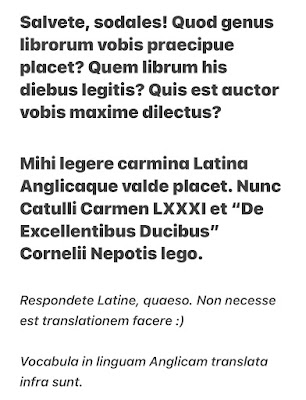Comenius: Orbis pictus (First edition: 1658; Engl. transl.
by Hoole: 1659)
It’s interesting to note three points about this book:
[1] It was the first widely used illustrated textbook for
children
[2] It became a best-seller in Europe for a hundred years.
[3] It is based on topics, not on grammar i.e. the language
was designed to be spoken, for the kids to talk about the world around them
bibliopōla │ the bookseller
vēndit librōs │ sells books
in bibliopolīō │ in a bookseller’s shop
quōrum cōnscrībit │ of which he writes
catalogum │ a catalogue
librī dispōnuntur │ the books are placed
per repositōria │ on shelves
& [et] ad ūsum, super │ and are laid open for
use upon
pluteum expōnuntur │ a desk
multitūdō librōrum │ a multitude of books
vocātur bibliothēca │ is called a library
vocabulary and notes
bibliopola, -ae [1/m]: bookseller
bibliopōlīum, -ī [2/n]: bookshop; New Latin, but not that
“new” since Comenius is using it
bibliothēca, -ae [1/f]: library; a room for books
pluteus, -ī [2/m]: bookshelf; Hoole, the translator,
describes it as a ‘desk’; although we associate the word with a complete piece
of furniture, “desk” can also refer to a lectern i.e. the sloped surface on
which the reader places the book, one which, in this case, seems to be bigger
than the reader himself!
repositōrium, -ī [2/n]: it has a vague dictionary
description of “something on / in which something else is placed” (Lewis and
Short) but it can refer to a tray or a cabinet; the translator writes “shelves”
but there also appear to be labelled storage boxes to the left of the image
librārius, -a, -um: pertaining to books
taberna, -ae [1/f] librāria: bookshop
librārium, -ī [2/n]: a place to keep books e.g. a
bookcase or bookshelf
Note [1]
-ārium
Note: -ārium; this suffix is used to refer to the purpose of
the noun, for example it often indicates where something is kept
armārium, -ī [2/n] (literally: a place for storing weapons);
cupboard
alveārium, -ī [2/n]: beehive
aquārium, -ī [2/m]: a watering place for cattle
sōlārium, -ī [2/n]: a terrace exposed to the sun; sundial
Technically, -ārium should be attached to a noun
e.g. liber + -ārium > librārium i.e. a place for books
However, it can be found with adjectives; the logic behind
these three in the Roman bathhouses is obvious:
[i] from caldus, -a, -um: hot > caldārium, -ī [2/n]: warm
bath; the place where hot water is kept
[ii] from frīgidus, -a, -um: cold > frīgidārium, -ī
[2/n]: the cold room
[iii] from tepidus, -a, -um: warm > tepidārium, -ī [2/n]:
the warm room
Note [2]: three examples of the passive:
[i] dispōnō, -ēre, disposuī [3]: distribute; arrange
Passive:
librī dispōnuntur │ the books are placed /
arranged
per repositōria │ on / along shelves
[ii] expōnō, -ere, exposuī [3]: display; set out
librī … super │ and are laid open for use
upon
pluteum expōnuntur │ a desk
[iii] vocō, -āre, -āvī [1]: call
Passive:
multitūdō librōrum │ a multitude of books
vocātur bibliothēca │ is called a
library
i.e. X is called Y



































